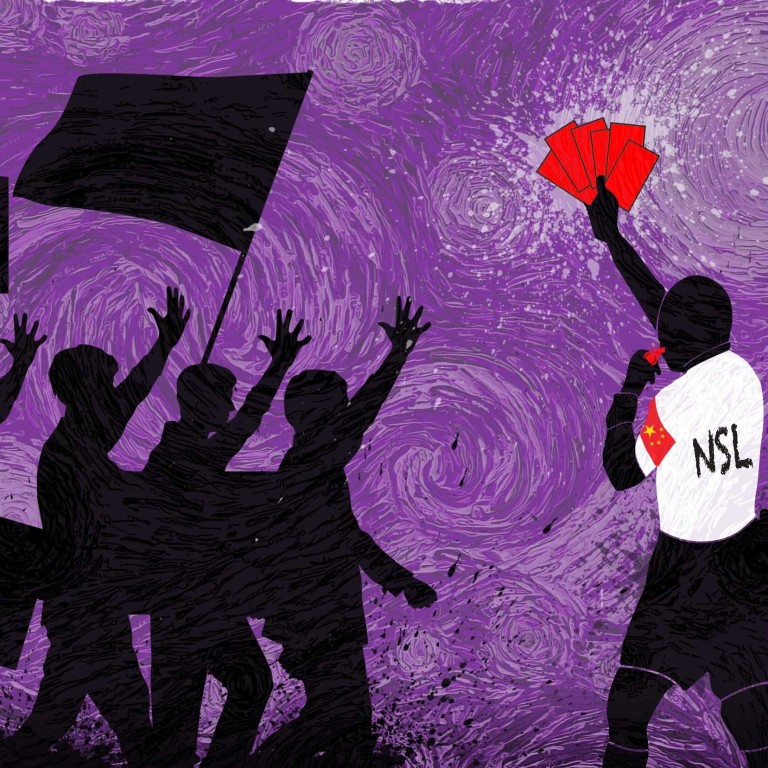
Hong Kong’s longest day: national security law passed in 15 minutes, but Beijing takes its time revealing details
- Even before the law came into force, its effects could be seen across the city
- Prominent activists resigned from their groups, while shops sympathetic to protesters took down political posters
It took just 15 minutes on Tuesday morning for China’s top legislature, the National People’s Congress Standing Committee, to endorse a national security law drawn up for Hong Kong.
Throughout the day as anticipation intensified, some localist groups in the city folded, activists announced they were quitting politics, and even “yellow” businesses that openly backed anti-government protesters said they were stopping support.
There seemed to be a chill in the air, even as Hong Kong’s pro-establishment politicians went to meet mainland envoys at the central government liaison office to pledge their full support for the new law.
Tuesday’s events were a display of Beijing mastery in creating a sense of fear, according to veteran China watcher Johnny Lau Yui-siu.
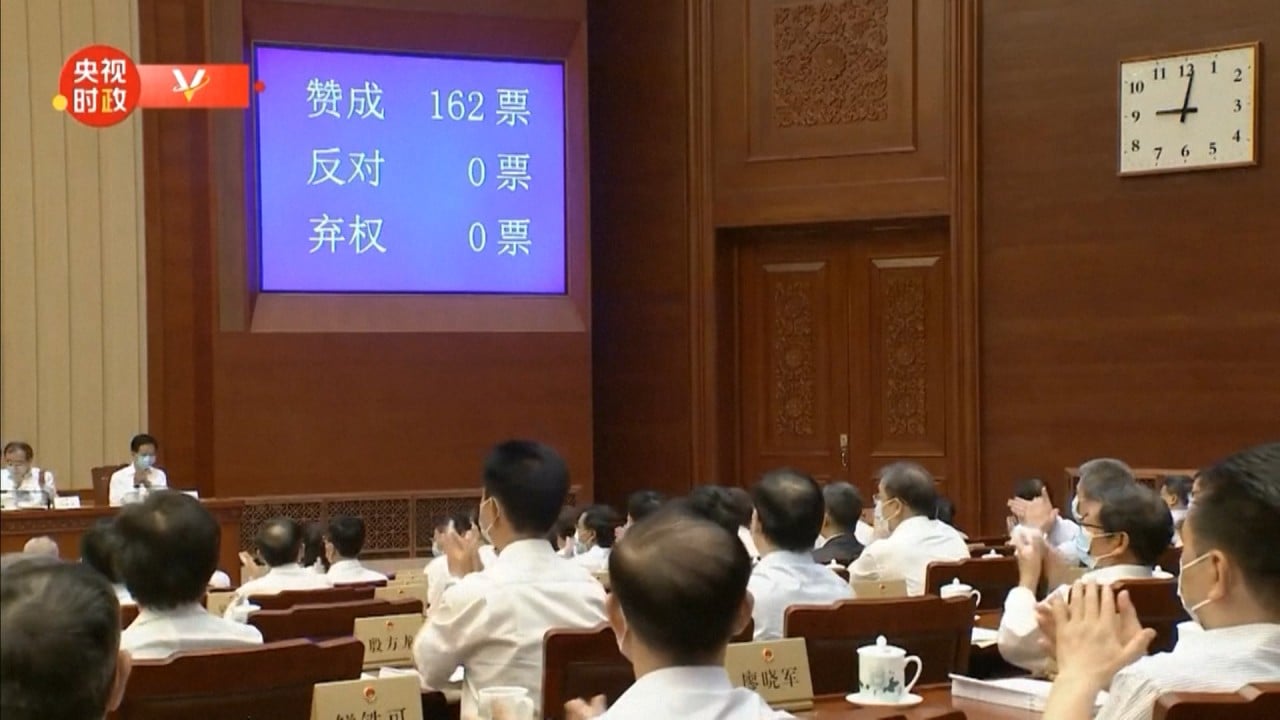
00:43
China passes national security law for Hong Kong
But a senior adviser to Beijing denied there was any sinister intent behind the decision to withhold details until the last minute. Rather, central government authorities wanted to adopt the law quickly to ensure hostile forces had no time to mobilise anti-China actions or spread misinformation, said Professor Lau Siu-kai, a vice-chairman of Beijing’s semi-official think tank, the Chinese Association of Hong Kong and Macau Studies.
In the morning, speculation was rampant that the new law had already been passed in Beijing.
Hongkongers knew that the law targeted acts of secession, subversion, terrorism and collusion with foreign forces to endanger national security. But they were not told what exactly was considered an offence, or what the maximum penalties would be.
Soon before 10am, Hong Kong leader Carrie Lam Cheng Yuet-ngor appeared at her weekly media briefing, but brushed aside reporters’ questions, saying: “It would be inappropriate for me to answer any questions and explain [the law] at this stage.”
All those countries which are pointing their fingers at China have their own national security legislation in place
But Johnny Lau said the way Beijing held back the details of the law showed the central government’s ability to manipulate public opinion.
“It was meant to create a sense of anticipation and a fear of the unknown,” he said. “Beijing also wanted to tell the Hong Kong people to learn the central government’s way of doing things, something many Hong Kong people have not got used to 23 years after the handover.”
As the waiting game dragged on in Hong Kong, the significance of the new law seemed to dawn on some young activists in the city.
In a short statement, Wong, 23, said: “I will continue to defend my home, Hong Kong, until they silence and eliminate me from this land.”
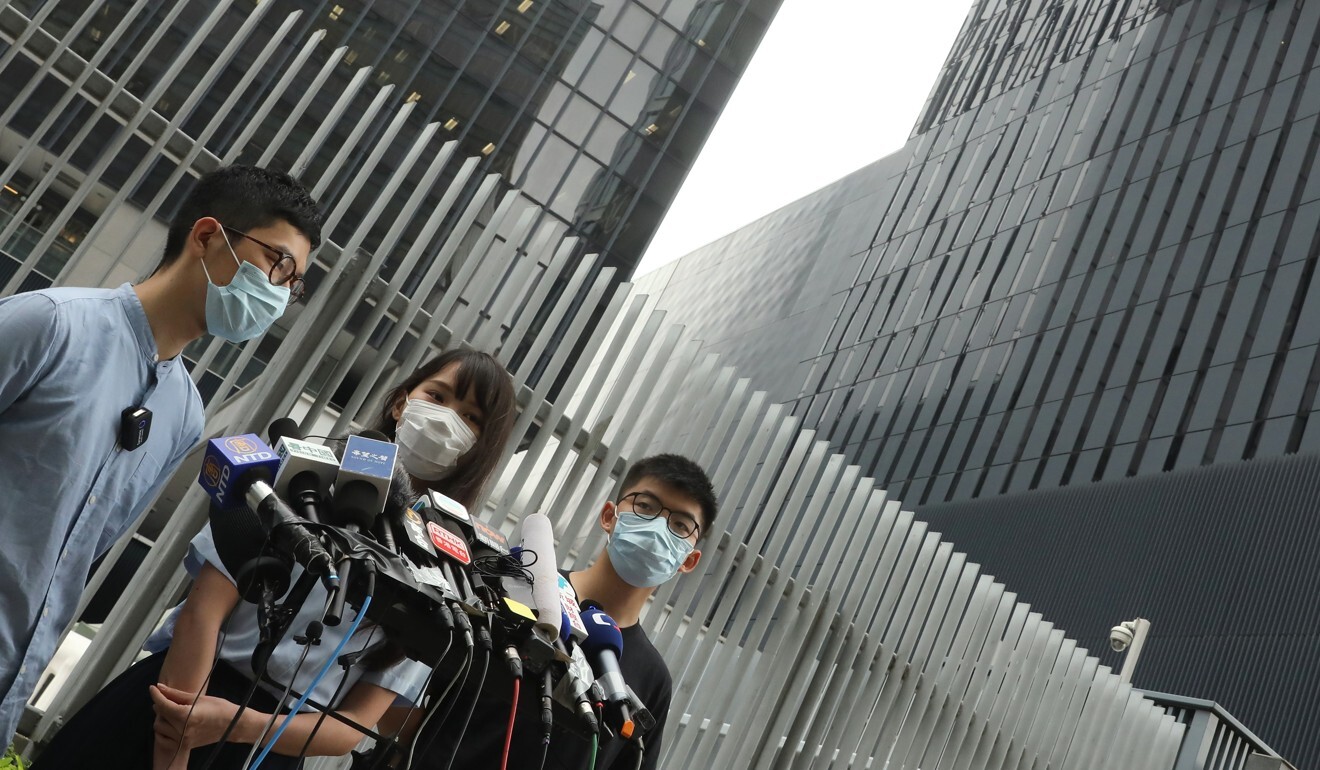
Wong, who shot to prominence for his role leading the 2014 Occupy protests that shut down parts of the city for 79 days, and for his lobbying in Washington, said it was no longer wrong for activists to be concerned about their lives.
Within hours, Demosisto announced it was disbanded. Soon afterwards, two more localist groups, the Hong Kong National Front and Studentlocalism, announced they would fold as well, though they claimed they would continue operating overseas.
Human rights group Amnesty International called the passage of the law “the greatest threat to human rights in the city’s recent history” and said that by passing the law before Hongkongers even knew the details, Beijing was trying to rule Hong Kong through fear.
Lau, however, said: “Perhaps that is precisely what Beijing wants Hong Kong people to feel.”
Pro-establishment heavyweight Tam Yiu-chung, a standing committee member who was in Beijing for the vote on the law, refused to say whether activists who quit their groups might still face arrest for threatening national security.
Hong Kong PLA garrison troops chase fugitives in drill as national security law is passed
“At this stage I cannot speak about details of the law,” he said in Beijing, adding that he only expected the full text to be made public in the evening.
News that the law had been passed and could take effect in Hong Kong in a matter of hours sent shock waves through businesses in the city’s so-called yellow economic circle.
Owners of these businesses supported the protest movement openly, displayed anti-government and anti-Beijing slogans and other materials on their premises, and were patronised by Hongkongers who backed the protesters too.
Some were startled when Cheung Chun-kit, owner of the Lung Mun Cafe chain and a high-profile supporter of the movement, announced that his chain was quitting the “yellow economic circle”.
That prompted the owners of some other “yellow” shops to start clearing out the protest propaganda from their premises too.
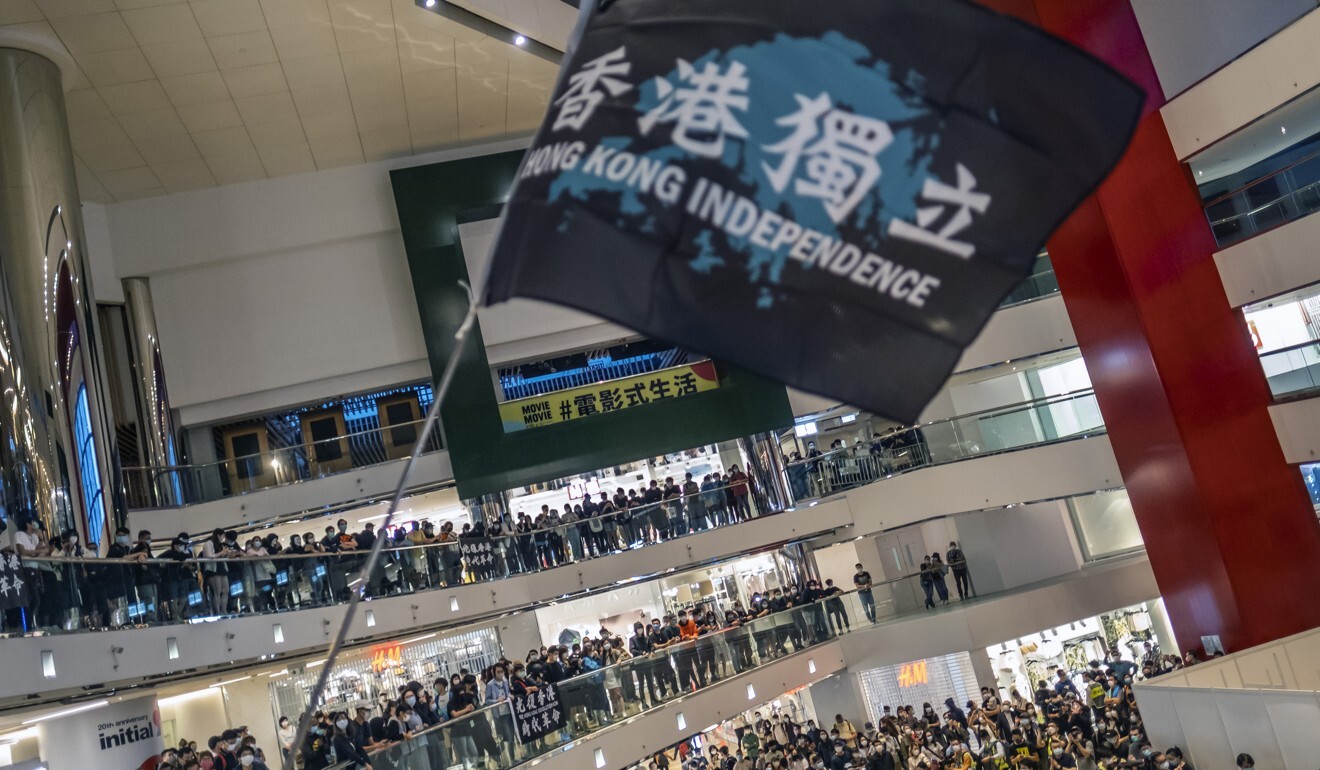
Gordon Lam Sui-wa, convenor of the Hong Kong Small and Middle Restaurant Federation which supported the “yellow” economy, said the national security law had created a chilling effect.
“Many yellow shops are worried that their ‘yellow’ propaganda posters will land them in trouble, and they might be accused of inciting subversion of the state,” he said.
Hui Ching, research director of the Hong Kong Zhi Ming Institute, a policy think tank, said he understood why Beijing was introducing the national security law for Hong Kong, but added: “It was a very bad PR exercise.”
He said the law was rushed through with no public consultation, and even after it was passed, Hongkongers did not know what, exactly, constituted a crime.
To many Hong Kong people, it has been a day of anxious waiting
“What do you want Hong Kong people to think? Are you asking Hong Kong to wake up the next morning and find that the law has already been implemented? To many Hong Kong people, it has been a day of anxious waiting,” he said.
While Hongkongers waited, a group of local delegates to the Chinese People’s Political Consultative Conference (CPPCC) and National People’s Congress streamed to the central government liaison office in Western district for an hour-long briefing by mainland envoys.
Speaking afterwards, CPPCC standing committee member Henry Tang Ying-yen said the group gave their full support for the law. Asked about the details, however, Tang said: “We did not see the full contents.”
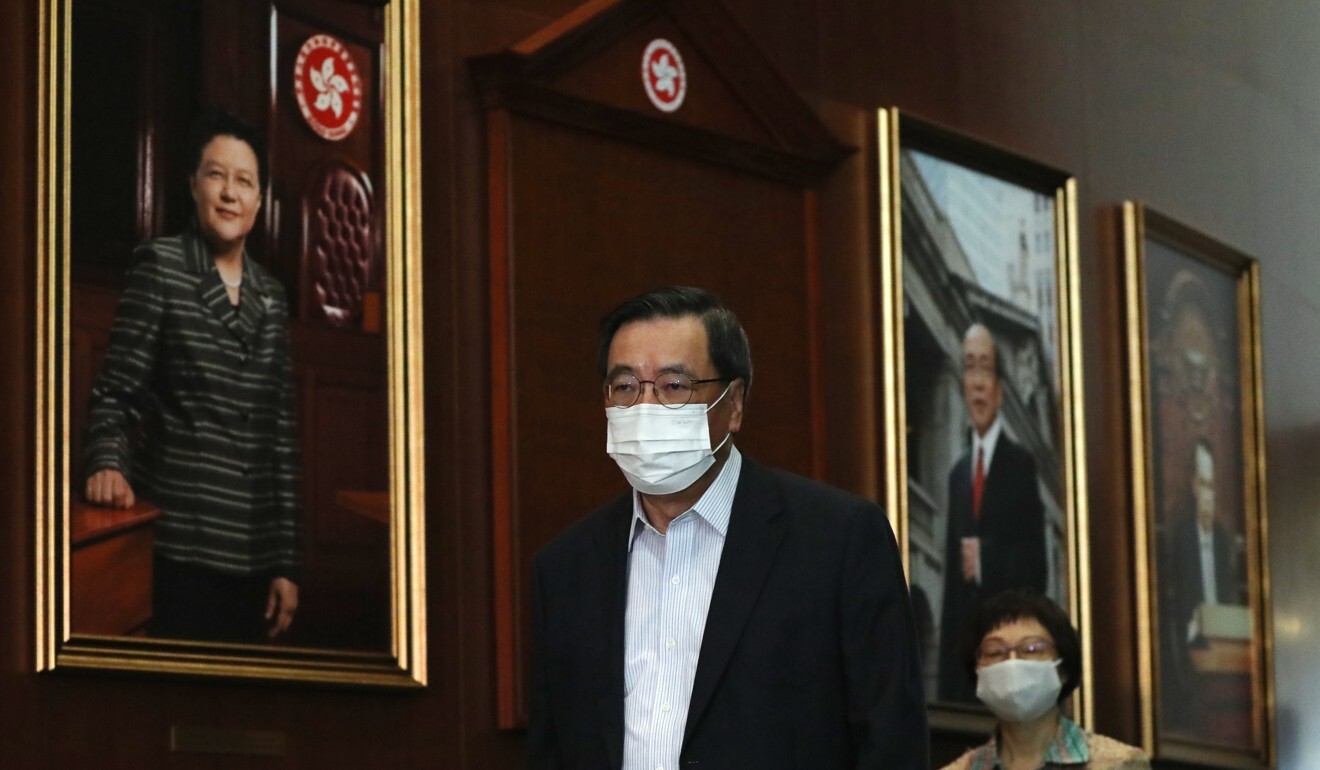
Legislative Council president Andrew Leung Kwan-yuen, speaking before details were unveiled, also stressed his support for the law. “The [law] can safeguard Hong Kong’s long-term stability and prosperity, and protect … the rights and freedoms long enjoyed by the vast majority of law abiding citizens.”
Leung said he understood there were different views in the society and he believed the central government had considered them.
Starry Lee Wai-king, the chairwoman of the pro-Beijing Democratic Alliance for the Betterment and Progress of Hong Kong, said the law would “bring peace back to Hong Kong and target the root cause of social unrest”.
Lau Siu-kai of the Chinese think tank under the Hong Kong and Macau affairs office said he understood why Beijing skipped public consultation and rushed through the law.
US tightens tech screw on China in move to strip Hong Kong special status
“The national security legislation is a sort of emergency legislation which had to be completed as soon as possible,” Lau said. “Both internal and external hostile forces are trying to undermine the legislative process and mobilise anti-China actions. They would exploit the articles in the draft law to disseminate misinformation and arouse fears and anxiety.
“By speedily drafting and promulgating the law, Beijing has left no time for these hostile forces to come together and organise large-scale protests.”
Pointing out that the law focused on only four types of national security threats, he said: “It represents Beijing’s bottom line, and Beijing will not accept any compromise or concession. In such circumstances, public consultations make no sense.”
On the popular online platform Hong Kong Discuss Forum, one user, Brother Mer, hoped the law would be retroactive. Another, laws168, said they supported putting all anti-China activists in jail on the mainland, while a third, moonbeen, wrote: “Long Live China.”

